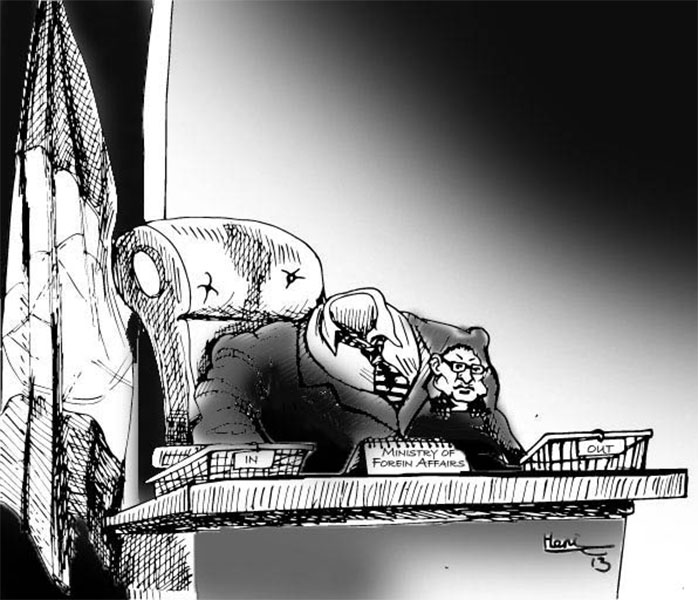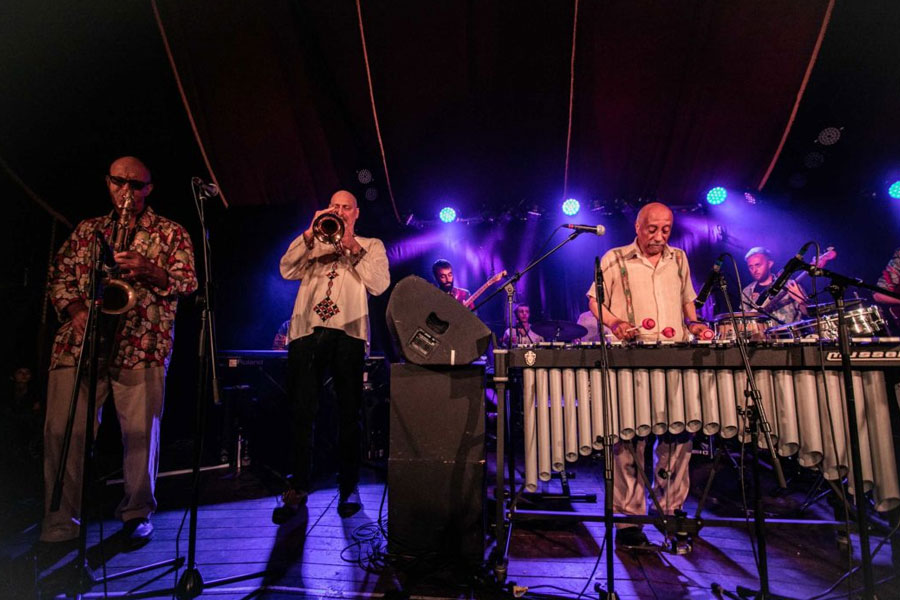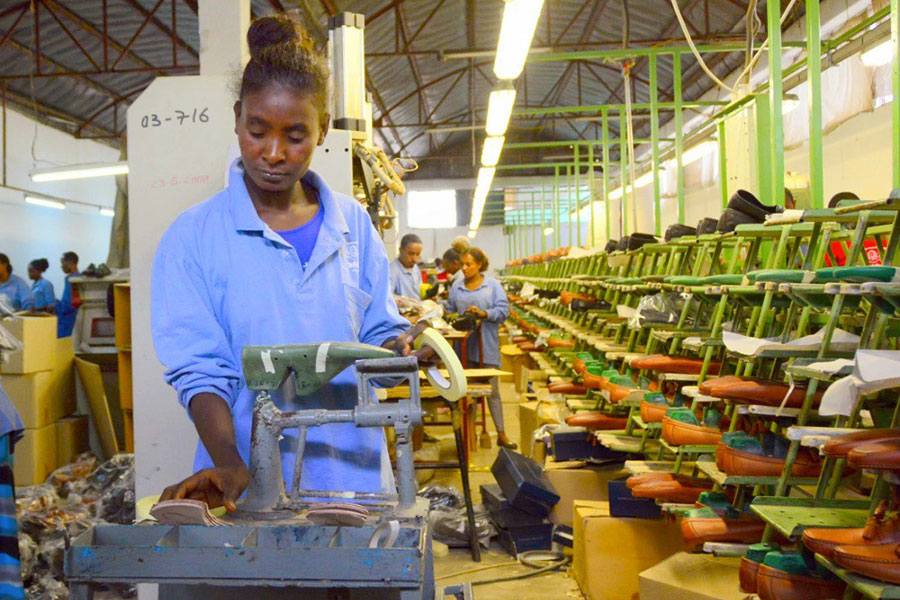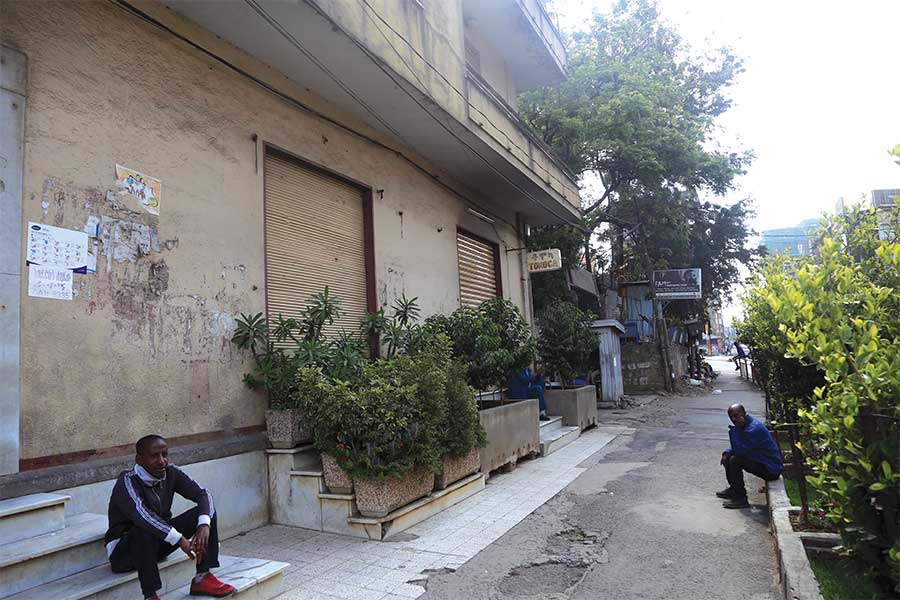
In the Atlas neighbourhood, cash notes are part of the decorative scene on a stage in Mimi’s Addis, a popular restaurant and lounge on Namibia Street. Seemingly oblivious to the money at his feet, Addis Legesse, a newcomer to the music scene, was performing the nostalgic song ‘Temar Lije’, mesmerising an audience immersed in the moment. The singer was paying tribute to the legendary singer, Alemayehu Eshetu, who passed away earlier this month.
Drinks were flowing onto the tables, but smiles have faded. The audience seems to have mixed feelings. They were celebrating the legacy of the Ethiopian music industry figure, trying to impersonate his graceful moves, majestic and ‘Elvis Presley’ like music genre. Yet, they were gripped by a sense of loss. Attracted by the inviting live music, more and more patrons were taking up the vacant seats. Mostly young people, the crowd had come to Mimi's Addis unwind.
The main attraction is the live music in the lounge's ample outdoor seating area, sprawled on roughly 600sqm of land.
When Mimi's Addis first opened its doors three years ago, little thought was given to hiring bands and musicians for live performances. Serving customers with a staff of 20, the establishment would only feature live music once a week, at most. However, in the past year, Mimi's has brought out performers three times a week to meet growing demand from its patrons. The change is inimical to what was observed in Addis Abeba's nightlife in recent years, when DJs were all the rage.
The Mimi's scene represents a return to an era past when live music was the bread and butter of those in the entertainment industry.
Sheri Mesfin, a.k.a DJ Sheri, has witnessed the shift to live music. He has worked as a DJ for over two decades, including six years at the Gaslight nightclub of the Sheraton Addis. He recalled this is the second time over the past decade that the city is showing a preference for live music, influenced by the diaspora community.
“It's great for the industry as many musicians are now coming out,” said Sheri.
DJ Sheri plays at Mimi’s Addis on Thursdays and Wube Bereha Lounge on Saturdays. He also performs at the Hyatt Regency once a month, in a show that attracts large crowds.
The trend is also a golden opportunity for musicians and lounges alike to earn money and build a reputation. It is also a welcome change for many who want to enjoy a good night out.
Friday nights at Mimi's Addis attract a full house. Yidnekachew Geleta and the Quartet Band are pictured performing for the crowd, which seems to want more and more live music.
This is a new normal of the nightlife for Addis Abeba, according to Surafel Kebede, general manager at Mimi's.
"It's a gold mine for the musicians and to everyone turning this into a business opportunity," said Surafel.
He has a point to drive home. The proliferation of bars and nightclubs offering live music is changing the night scene of the capital. Leaving aside the country's volatile situation, these venues seem oblivious to the ever-rising cost of living and the ongoing civil war. They are the preferred choice for those who want to relax and enjoy a night out with friends. The influence of pre-existing live music spots such as Music Revolution, V-Lounge, and Mesafint Bet has also contributed to the shift in preferences.
Kidus Hintsaye, in his late twenties, first fell for live music on a Tuesday night almost two years ago at Music Revolution, also located along Namibia Street. Though he stumbled on the lounge by chance, live performances by Shewandagn Hailu kept him coming back. He now enjoys the shows once or twice a week with friends, depending on how much he spends.
“They're costly, but at least we know the artists are getting a good share of it,” said Kidus.
He spends as much as 5,000 Br on a night out with a group of three or four friends. He finds clubs with live music attractive for their relative safety, as opposed to clubs with DJs. They are hectic and prone to arguments and brawls between habitues.
“I can be certain of my safety in places with live music as there is little chance of fights breaking out,” he said.
The new demand for live performances comes with its own pressures for the hosting venues. Despite generating revenues as much as half a million Birr or more on a night with live performances, representing up to 50pc more than on nights without the band, the bars have to contend with remuneration for the musicians. They spend close tens of thousands of Birr a night on bands and an additional 10,000 Br for performers who come solo. The bars charge double the usual for a beer to make up for the expenses, reaching as much as 80 Br. Should customers want hard drinks, they would be asked to pay three or four times the retail price of the drinks at liquor stores.
However, the demand shows no signs of slowing down, and business is good for Mimi's. The performers who take the stage there are pleased with it.
Yidnekachew Geleta, 33, is a musician featured on the Ethiopian Idol programme nearly a decade ago. He performs three or four nights a week at venues including Mimi's, Palmy and Queen's lounges, earning between 5,000 Br and 10,000 Br for a performance. He is elated about the enthusiasm of Addis Abeba's night goers, performing for them old melodies played by Neway Debebe and the late Tilahun Gessesse. But Yidnekachew is notable for his impersonation of Mahmoud Ahmed.
Young musicians like him and band members, who were too young or not yet born when legends such as Tilahun and Mahmoud graced the stages of nightclubs in Addis, now draw in huge crowds, often performing their own renditions of classic songs.
“It's presenting an exciting opportunity for veteran musicians and amateurs alike,” says Yidnekachew. "I make my living from this job."
Most musicians earn similar amounts, but industry veterans can make up to 80,000 Br for a single performance. Some even play several venues in a single night, and such is the demand.
Bands are also among the beneficiaries.
Consisting of four members - guitar, double bass, drum, and saxophone - Ethio Quartet Band plays at Mimi’s on Fridays, the only day and stages the band plays in a week. The band plays over 25 songs a night, often music from the 1950s, 60s, and 70s. Though there is ample opportunity to perform elsewhere, bandleader and bassist Eyouel Mengistu says they prefer to keep the performances to a minimum, using their time to work on studio recordings. Still, some members perform solo after they wrap up at Mimi's.
“More and more audiences are choosing live music," said Eyouel.
V-Lounge, a mainstay in nightlife for over a decade, features live performances every night of the week. The lounge was first established with a small band playing the stage in Mafi City Mall on Cameroon Street. As demand for live music grew, it eventually moved to a larger space in the Wello Sefer neighbourhood. Now veterans such as Tsegaye Eshetu and Madingo Afework often take the stage. Hundreds crowd the lounge every night though the space has the capacity to hold 1,000 guests. It was jam-packed before the pandemic hit, recalled Alemayehu Abera, general manager.
“V-Lounge built its name and reputation because it prefers live music,” said Alemayehu.
The lounge is famous among industry players for its high payouts to performers. It pays a minimum of 10,000 Br to amateur musicians, while those with names expect six times that amount for a single performance, which is often just five or six songs. Most nights, five musicians take the stage—this cost V-Lounge`s managment up to 1.5 million Br a month in performers` fees.
The lounge also features an in-house band of 10 to accompany the musicians. They are among the 147 staff V-Lounge employs at two of its locations.
The lounge spends over two million Birr on rent every year, but the largest expense remains liquor, a commodity that has seen prices double over the past two years. Sometimes, the liquor expenses add up to half of the total revenues, according to Alemayehu.
The growing demand for live music also saw reggae artist Yohannes Bekele, a.k.a. Jonny Ragga, come back. A singer and songwriter, Yohannes has been in the music industry for over two decades, having a gig in producing and promotion. He has largely been absent from the live music scene for the past two years, dedicating his time to Awtar, a music streaming platform he co-founded. He now performs on Thursdays at Music Revolution, alongside Abinet Agonafir and Te'amir Gizaw.
He saw the COVID-19 pandemic obliterating the music industry over the past two years.
"We're not playing music in studios, concerts were cancelled, and clubs were not actively working," said Yohannes, attributing the growing popularity of live music to several factors, mainly the proliferation of contests on TV shows such as Balageru Idoland Fana Lamrot.
To the delight of Kidus and his contemporaries, these shows bring new and younger voices to the entertainment industry, captivating an ever-animated crowd for live performances.
PUBLISHED ON
Sep 10,2021 [ VOL
22 , NO
1115]

Viewpoints | Apr 28,2024

View From Arada | Dec 04,2020

Radar | Dec 05,2020

Editorial | Oct 31,2020

View From Arada | Apr 10,2021

Fortune News | Aug 24,2019

Radar | Dec 19,2020

Fortune News | May 28,2022

Fortune News | Apr 04,2020

Viewpoints | Sep 10,2022

Jul 13 , 2024 . By AKSAH ITALO
Investors who rely on tractors, trucks, and field vehicles for commuting, transportin...

Jul 13 , 2024 . By MUNIR SHEMSU
The cracks in Ethiopia's higher education system were laid bare during a synthesis re...

Jul 13 , 2024 . By AKSAH ITALO
Construction authorities have unveiled a price adjustment implementation manual for s...

Jul 13 , 2024
The banking industry is experiencing a transformative period under the oversight of N...

Jul 20 , 2024
In a volatile economic environment, sudden policy reversals leave businesses reeling...

Jul 13 , 2024
Policymakers are walking a tightrope, struggling to generate growth and create millio...

Jul 7 , 2024
The federal budget has crossed a symbolic threshold, approaching the one trillion Bir...

Jun 29 , 2024
In a spirited bid for autonomy, the National Bank of Ethiopia (NBE), under its younge...